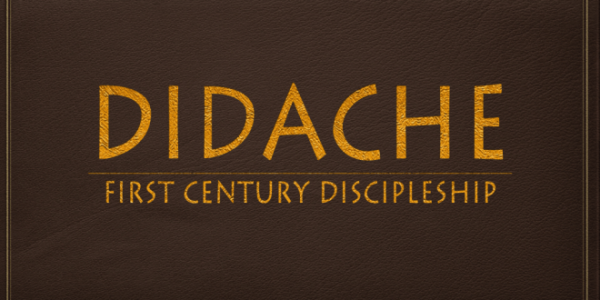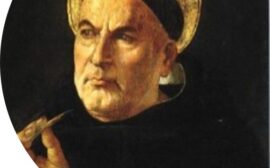By: Michelle Johnson | July 11, 2022
Church history – do those two words interest or bore you? Personally, I have traversed that pendulum. The thought of books with dates, names – many of which were difficult to pronounce or remember, places I couldn’t locate on a map, and customs I didn’t understand, was overwhelming at best. However, I now find myself completely interested, to the point of choosing to research and write about church history (particularly early Christian monasticism).
When asked about church history before, I would have embarked on a walk through the content of the four Gospels (Matthew, Mark, Luke, and John) – the history of Jesus’ life and ministry on Earth. The earliest beginnings of the church and the lives of the Apostles as recorded in Acts would be next. The record of Paul, Peter, and the others spreading out geographically, setting up churches, and sharing all they had witnessed and learned from Jesus. My discussion of church history would then have likely jumped the late 19th/early 20th century when grandparents arrived in the Midwest and began attending local churches that gave rise to the churches my immediate family became a part of. This would have been my explanation of church history.
If you look carefully at that answer, you’ll notice there is a lot of time missing – a whole 18+ centuries. The church tradition I grew up in didn’t spend much time teaching about the subapostolic generation, the heresies and councils that emerged in the early centuries of the first millennium, the texts that exist which give us insight into the struggles (and fights) to understand what is now known as the doctrine of the Trinity, and so much more!
It was not until graduate school that I learned names like: Augustine, Athanasius, Arius, Ignatius, Basil, and Antony. I discovered there were great controversies over teachings about Jesus and the Holy Spirit and their relation to God the Father. There were councils convened to discuss, argue, study, define, and articulate many of the beliefs I take for granted today. There are heresies that don’t look all that different from some ideas circulating in our own time. I would argue church history is our history. It is rich with lessons, both positive and negative, and instructive for keeping our feet deeply rooted in our walk with Jesus. I intend to delve into several articles that will share some of the people, places, events, and documents I have had the privilege of studying and would invite you to join me along the way.
The Didache
Let me introduce the Didache. “Didache” is a Greek word that means teaching or instruction. The longer title is – “The Teaching of the Lord Through the Twelve Apostles to the Nations (or Gentiles)”. What is the Didache? It is best described as a church manual. A rather short document – the translation I use is published in a book that is just 27 pages long.[1] The Didache is divided into two distinct sections and a conclusion.
Section One: Two Ways of Life
The first section describes two ways of life – the way of life and the way of death. The way of life is described first. To life the way of life: love God and love your neighbor, don’t do anything to anyone you don’t want done to you. The author provides instruction about what to do and what not to do to fulfill these commands. The way of death is the path chosen by those who “persecute good people, those who hate the truth, those who love a lie…” etc.[2]
Section Two: Liturgical Instruction
The second section contains what might be referred to as liturgical instruction. For those less familiar with the term “liturgical” this section includes instruction for things related to worship and church life: fasting, baptism, the Eucharist (the Lord’s Supper or Communion), hospitality, charity and giving, and the selection of church leaders.
Conclusion of the Didache
The conclusion serves as a reminder that followers of Jesus are to live in anticipation of His return. Be ready! Gather often! This encouragement includes a brief description of what they can expect as the end nears.
Date of the Didache
When was the Didache written? We don’t know the exact date but, many scholars agree it originated somewhere between mid-first century and AD 180.[3]
Author of the Didache
Who wrote it? The identity of the author is not known. Everett Ferguson offers some helpful advice when considering who authored this text. Because the long title includes a reference to the twelve apostles, there are some that assume they wrote it. According to Ferguson, the mention of the twelve apostles was a common technique meant to convey authority of the content, not name the specific author.[4]
Importance of the Didache
The question of where it was written is also debated, some argue for Egypt while many I looked at feel quite certain it was written in Syria.[5]
Why is the Didache important for us to read today? Scholars offer many reasons. Ferguson says its important because it teaches us about church life at the time.[6] Quasten says it helps us understand what would be taught to new believers or used to disciple others.[7] O’Loughlin offers three reasons why we should read the Didache today. First, it helps us forget and remember. When one decides to become a follower of Jesus, there are things that are to be left behind. In other words, we need to forget some things. He also says that it is easy for us to assume that things have always been done or understood exactly the way we do them or understand them today. In this case, it is good for us to remember. Reading a text such as the Didache will help both our forgetting and our remembering.[8] Second, change and development sometimes take place at such a slow pace, we are unaware of it. Studying and reading the Didache helps raise our awareness and gives us a chance to examine the process.[9] Lastly, Christianity is historical. The Didache gives us the opportunity to get to know the generations that lived in close time proximity to the apostles who learned directly from Jesus. These are our spiritual forefathers and a document that gives insight to what was taught and how they lived out their faith.[10]
About the Author
 Michelle Johnson is a Ph.D. Candidate in the Theology and Apologetics program at Liberty University. She also earned her M.A. in Theological Studies and her M.Div. in Professional Ministries at Liberty University. Michelle graduated from the University of Minnesota with her undergraduate degrees. She and her husband Steve live in Mankato, Minnesota, where she also serves in women’s ministries. In addition to her love of theology and apologetics, Michelle also has a passion for historical studies, particularly the theology of the Patristics. When she is not spending time reading or writing, Michelle can often be found dreaming of her next travel adventure or enjoying a great cup of coffee. Michelle Johnson serves as the Executive VP and Managing Editor of Bellator Christi Ministries.
Michelle Johnson is a Ph.D. Candidate in the Theology and Apologetics program at Liberty University. She also earned her M.A. in Theological Studies and her M.Div. in Professional Ministries at Liberty University. Michelle graduated from the University of Minnesota with her undergraduate degrees. She and her husband Steve live in Mankato, Minnesota, where she also serves in women’s ministries. In addition to her love of theology and apologetics, Michelle also has a passion for historical studies, particularly the theology of the Patristics. When she is not spending time reading or writing, Michelle can often be found dreaming of her next travel adventure or enjoying a great cup of coffee. Michelle Johnson serves as the Executive VP and Managing Editor of Bellator Christi Ministries.
Notes
[1] R. Joseph Owles, trans., The Didache: The Teaching of the Twelve Apostles (CreateSpace, 2014).
[2] Ibid., 11.
[3] For those interested in exploring some of the discussion regarding the date of The Didache I would recommend: Thomas O’Loughlin, The Didache: A Window on the Earliest Christians (Grand Rapids, MI: Baker Academic, 2010), 24-26. For a more academic option: Johannes Quasten, Patrology: The Beginnings of Patristic Literature, Patrology 1 (Notre Dame, IN: Ave Maria Press, 1992), 36-38.
[4] Everett Ferguson, Church History – From Christ to the Pre-Reformation, Second edition (Grand Rapids: Zondervan, 2013), 49.
[5] Quasten, Patrology, 37. See also Everett Ferguson, Church History – From Christ to the Pre-Reformation, 50.
[6] Ferguson, Church History – From Christ to the Pre-Reformation, 49.
[8] O’Loughlin, The Didache, xv-xiv.
[9] O’Loughlin, The Didache, xiv-xv.
[10] O’Loughlin, The Didache, xv-xvi.
Copyright, 2022. Bellator Christi.






[…] Source: Lessons from Church History: The Didache […]